Most customers find themselves in a tough situation when it comes to cloud. All want the benefits of the public cloud, but also need the flexibility of location and the assurance that their data are always protected on-premises.
Most public cloud providers have been unable to meet these needs. Their on-premises public cloud extensions have a small subset of services and cannot migrate all workloads as-is. Few can install, maintain, and support their offerings as a single solution, end-to-end. They also do not provide any metrics for meeting service level targets.
Without a public cloud of their own, legacy hardware vendors are positioning “cloud-like functionality” to their traditional on-premises IT infrastructure. However, their products are not public cloud extensions because they neither own nor operate a public cloud. They also depend on third-party software vendors to build out their offerings.
Dedicated Region Cloud@Customer from Oracle fills a significant gap. As a provider of both cloud infrastructure and business-critical database and applications, we have many decades of on-premises experience to bridge these tradeoffs. Let’s review how Oracle Dedicated Region Cloud@Customer meet customer needs at delivering public cloud services into customers’ data centers across five meaningful metrics: Services Parity, Migration, Service Level Agreements, Security and Pricing.
Same as Public Cloud
Dedicated Region Cloud@Customer from Oracle is the precise equivalence of the Oracle public cloud, extended to your data center. Customers can implement a broad set of workloads to meet their business requirements using a complete set of modern IaaS, PaaS and SaaS services.
AWS Outposts may share the same hardware as its public cloud but it ends there. When customers buy Outposts, they do not get all of AWS public cloud services. Azure Stack Hub systems are different than the ones in the Azure public cloud because Microsoft relies on external legacy vendors such as HPE and Dell. Like Outposts, Azure Stack Hub runs only a subset of Azure public cloud services.
HPE and Dell are positioning “as-a-Service” to bring “cloud-like functionality” to their existing legacy on-premises hardware. However, HPE GreenLake products are not extensions of its public cloud because HPE shut down its own public cloud in 2016. Dell’s Virtustream public cloud subsidiary does not have any instances for Dell APEX.
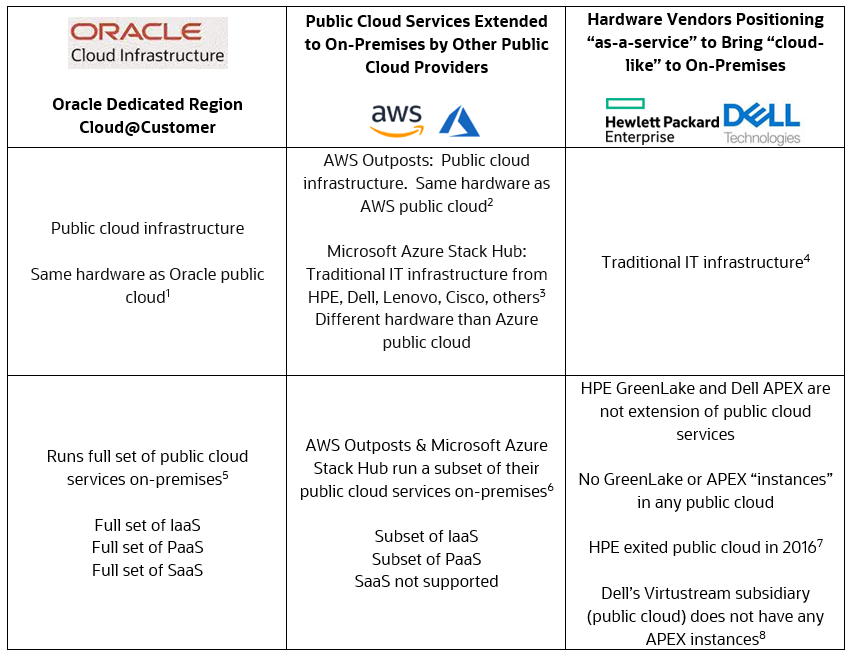
Migrate with Confidence
Customers migrate business-critical databases and applications to public cloud to gain operational efficiency, performance, and availability. Customers want to execute these migrations without changing familiar software or IT processes.
On-premises physical servers run workloads directly on bare metal hardware when performance, latency, or security are required. Customers want the same options when choosing an on-premises public cloud. offering. Most enterprises also run VMware in their data centers. They want to migrate their VMware estate without changing familiar IT processes or introducing complexity to their operations.
For example, customers of Oracle database retain all features when migrating to Oracle Dedicated Region Cloud@Customer. While Oracle Dedicated Region Cloud@Customer delivers unique features such as Real Application Clusters, Active Data Guard, others, for Oracle database, neither AWS Outposts, Microsoft Azure Stack Hub, HPE GreenLake nor Dell APEX support Oracle database. Oracle Dedicated Region Cloud@Customer also gives users the option to run fully managed databases in their data centers, completely administered by Oracle, instead of by the customer’s IT staff. Finally, Amazon Aurora and Redshift won’t run inside your data centers because Outposts don’t support them. Similarly, Azure SQL and Synapse Analytics only runs in Azure because they are not supported on Microsoft Azure Stack Hub.
Customers of Oracle Dedicated Region Cloud@Customer run their VMware workloads with full control. They have the same visibility & access as their on-premises VMware estate. VMware workloads won’t run on Azure Stack Hub. VMware workloads run on a derivative of Outposts (“VMware Cloud on AWS Outposts”) but customers do not have root access to their VMware environment because its update policies & access is control by AWS and VMware.
Finally, neither AWS Outposts, Microsoft Azure Stack Hub, nor HPE GreenLake can run non-virtualized workloads due to lack of support for bare metal instances.
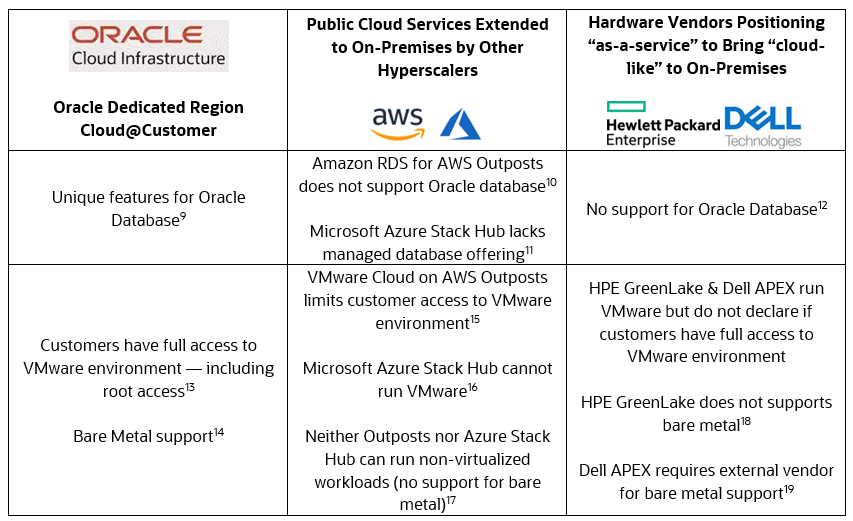
The Assurance of SLAs and End-to-End Support
SLAs (aka Service Level Agreements) are important metrics because they set clear and measurable standards. If the product fails to meet SLAs, there are consequences for the vendor to fulfill their commitments. While AWS and Microsoft have never declared SLAs for their products, Oracle provides end-to-end financially backed SLAs for Oracle Dedicated Region Cloud@Customer in three areas: Availability, Performance, and Manageability. As of writing, HPE provides SLAs for one of its 17 GreenLake models. Customers gain the peace of mind knowing their workloads will perform at a high level on Oracle Dedicated Region Cloud@Customer, backed by Oracle.
Providing, maintaining, and supporting an end-to-end solution is a challenge for Microsoft Azure Stack Hub: HPE, Dell, Lenovo, etc. install Azure Stack Hub hardware. Microsoft install Azure cloud services. Customer’ Azure Stack Hub Operator maintains the systems. Similarly, HPE and Dell also depends on external vendors: roaches: Dell requires VMware to build out APEX and HPE requires at least seven external vendors (Microsoft, SAP, VMware, Red Hat, Qumulo, Citrix, Nutanix) to build out its GreenLake portfolio.
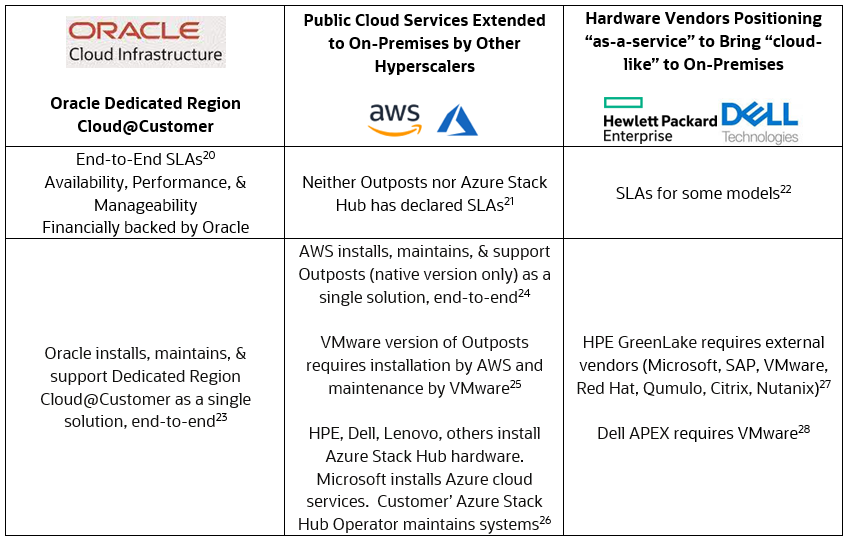
Protecting Workloads with Full Security
Protecting workloads and data is paramount and Oracle takes it very seriously. Customers’ workloads running on Oracle Dedicated Region Cloud@Customer are better protected because it inherits the same full set of security services from the Oracle public cloud. Customers’ data and workloads are not fully protected on Outposts and Azure Stack Hub because they do not support a full set of security services as their public clouds.
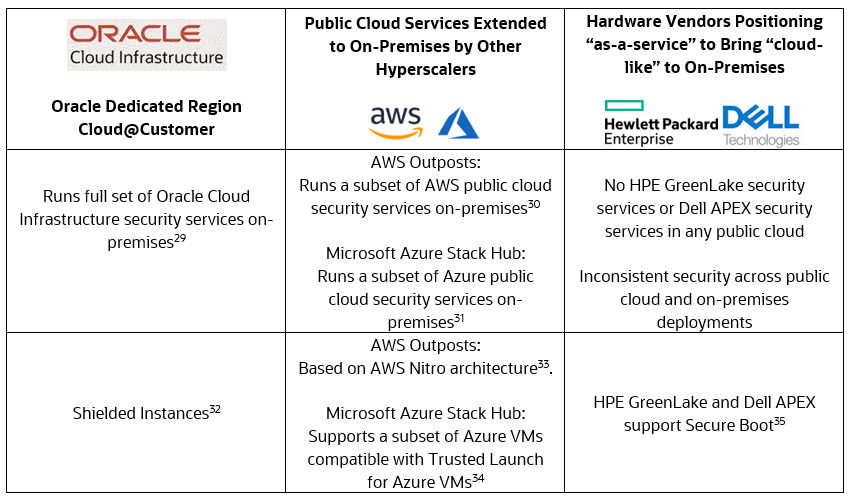
Meeting Budgets with Consistent Pricing
A proper cloud provider offers consistent pricing and billing across all deployments. Service pricing should be consistent across products and across all regions in the cloud (and on customer premises). This lets customers plan budgets and run their businesses rationally.
Customers pay the same price regardless of where they consume Oracle cloud services. Prices of IaaS, PaaS, and SaaS services are the same on Oracle Dedicated Region Cloud@Customer or in the Oracle public cloud. Such consistency helps customers stay within budget regardless of where their databases and applications are deployed.
Customers pay 20% to 40% more to use cloud services on AWS Outposts than on AWS public cloud. AWS Outposts prices in South America, EMEA & APAC are 20-25% higher than in North America. Cloud services running Microsoft Azure Stack Hub are 30% to 50% lower than in Azure region. However, customers must take on the operating costs of Azure Stack Hub hardware. Such inconsistencies make it difficult to forecast accurately for applications running in multiple regions.
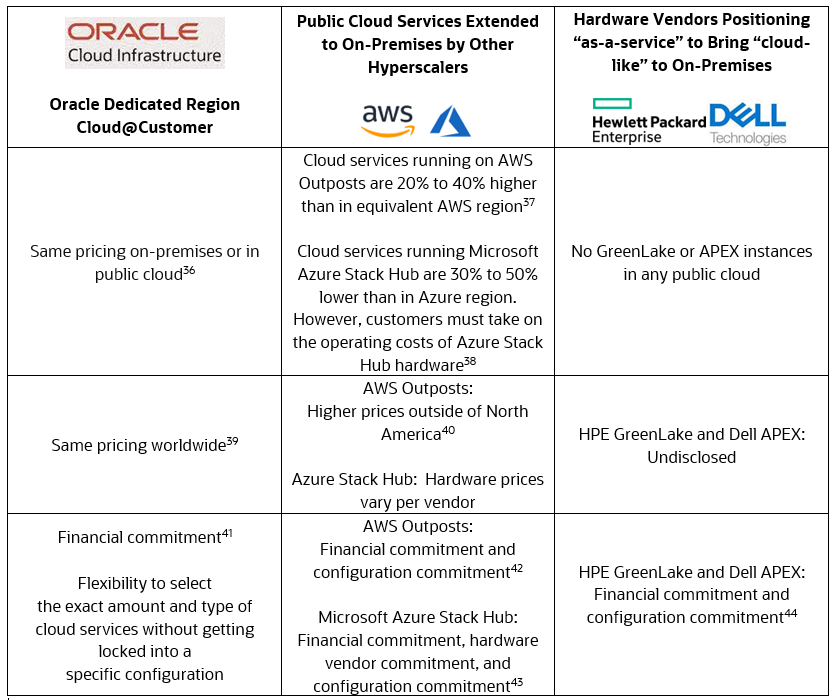
- Oracle Dedicated Region Cloud@Customer FAQs. AWS Outposts FAQs. Microsoft Azure Stack Hub FAQs.
- HPE GreenLake uses traditional IT servers and storage. Dell APEX uses hyperconverged appliances.
- AWS Outposts FAQs. Microsoft Azure Stack Hub VM considerations.
- HP exits public cloud. Dell’s VirtualStream subsidiary.
- Unique features for Oracle Database. Amazon RDS for AWS Outposts does not support Oracle database. Microsoft Azure Stack Hub lacks managed database offering.
- HPE GreenLake does not support Oracle Database. Dell APEX does not support Oracle Database.
- Oracle Cloud VMware Solution
- Oracle Dedicated Region Cloud@Customer supports bare metal
- VMware Cloud on AWS Outposts FAQs. Microsoft Azure Stack Hub cannot run VMware.
- AWS Outposts cannot does not support bare metal instances. What is BareMetal infrastructure on Azure?
- None of HPE GreenLake portfolio supports bare metal. Dell APEX requires external vendor for bare metal support.
- Oracle Cloud Infrastructure Service Level Agreements. AWS Service Level Agreements. Azure Service Level Agreements.
- Only one of 17 HPE GreenLake offerings offering SLAs. Only two of seven Dell APEX offerings offer SLAs: APEX Cloud Services with VMware Cloud and APEX Data Storage Services
- Getting Started with VMware Cloud on AWS Outposts
- HPE, Dell, etc. install Azure Stack Hub hardware. Microsoft install Azure cloud services. Customer’ Azure Stack Hub Operator maintains systems.
- HPE GreenLake requires Microsoft, SAP, VMware., Qumulo, Citrix, Nutanix. Dell APEX requires VMware:
- Oracle Dedicated Region Cloud@Customer runs a full set of Oracle Cloud Infrastructure security services on-premises. The following AWS public cloud security services do not run in AWS Outposts: Amazon Cognito, AWS WAF, Secrets Manager. The following Azure public cloud security services do not run on Azure Stack Hub: Microsoft Defender for Cloud, Azure Information Protection, Azure DDoS Protection, Microsoft Sentinel, others.
- AWS Outposts is based on AWS Nitro architecture. Microsoft Azure Stack Hub supports the following Azure VMs. Trusted Launch for Azure VMs supports the following Azure VMs: Only two of Azure Stack Hub’s VMs (DSv2-series and Fsv2-series) are supported by Trusted Launch for Azure VMs.
- HPE servers used in HPE GreenLake supports Secure Boot. Dell servers used in Dell APEX supports Secure Boot.
- Cloud services running on AWS Outposts are 20% to 40% higher than in equivalent AWS region. Cloud services running Microsoft Azure Stack Hub are 30% to 50% lower than in an Azure region. However, customers must take on the operating costs of Azure Stack Hub hardware:
- AWS Outposts pricing
Forward Perspective
Register for the Oracle Live Event on June 21, 2022: “Hybrid Cloud Redefined—New, Unmatched OCI Solutions for Customers” to learn how Oracle Dedicated Region Cloud@Customer meets customer requirements for on-premises public cloud.
